Through a video connection, we can watch the hustle and bustle of seeds being sown, young plants being packaged, and charts full of plants ready to be delivered to local growers. This online guided tour, offered by Joshua Mugendi of GrowPact, takes place in Kitane. This Kenyan town is home to a project for local cultivation in developing counties.
After the conversation with Joshua, we can safely say that the project is already past the proof of concept phase. Before he became an entrepreneur, Joshua was a researcher at the Institute of Tropical Agriculture. In those days, "horticulture was not popular here."
Things have changed, and nowadays, the situation is quite different. "Horticulture is on the rise here. Partly because we realize that Kenya used to be highly dependent on tomato imports. Here, on average, a person consumes 2 to 3 tomatoes a day; we are still growing few tomatoes ourselves."
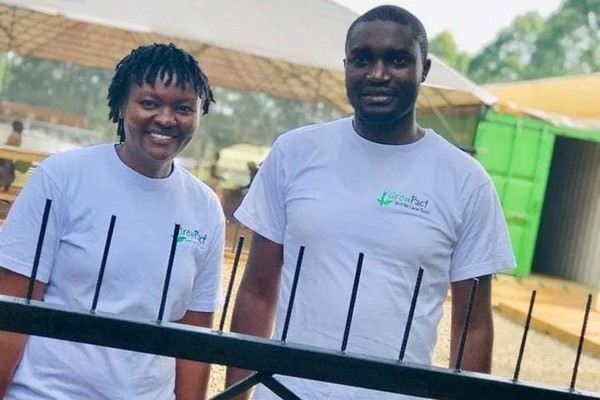 Mercy and Joshua Mugendi.
Mercy and Joshua Mugendi.
Revolutionary concept
In 2015, Joshua and his wife Mercy founded a plant nursery. They focused on the stevia plant, which is known for its sweet leaves that are used as a sugar substitute. "Unfortunately, our delivery contract was canceled before we even started, and we lost all our savings."
Around that time, Joshua met the Dutch entrepreneur. The latter prefers to stay out of the limelight, but Joshua refers to him multiple times. "He told me about a revolutionary concept for horticulture in upcoming economies. It's a turnkey concept, we call it the green toolbox."
Initially, the idea was to sell this toolbox in African countries. Joshua and Mercy visited the Netherlands to discuss this idea. When they got back to the African continent, they quickly realized that the local market was not ready for this concept. "People thought it was way too expensive for their way of growing."
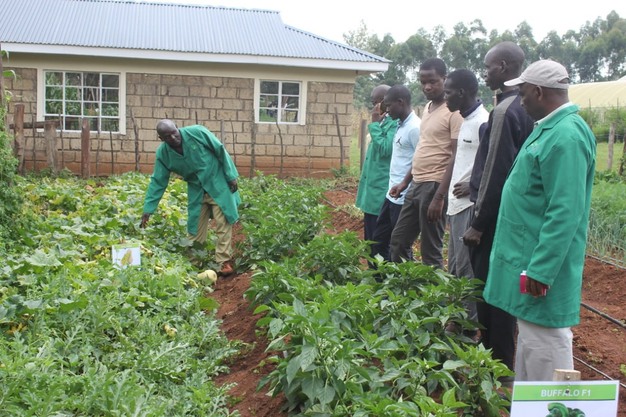 To grow, GrowPact has put a lot of effort into local visibility through media appearances and open field days at the nursery in Kitale.
To grow, GrowPact has put a lot of effort into local visibility through media appearances and open field days at the nursery in Kitale.
A market gap
Being convinced of the effectiveness of the GrowPact concept, they decided to launch a project themselves that served as proof of concept. "It's a gap in the market. So far, the larger professional growers could access plant material through a local plant grower, however, the smaller, more vulnerable growers couldn't."
In 2017, the plant nursery was set up. With what was delivered with two sea containers, a complete nursery was built. In 2018, the project was operational. "When the nursery was up and running, we realized that there was a lack of cultivation knowledge. Consequently, we founded the GrowPact Academy."
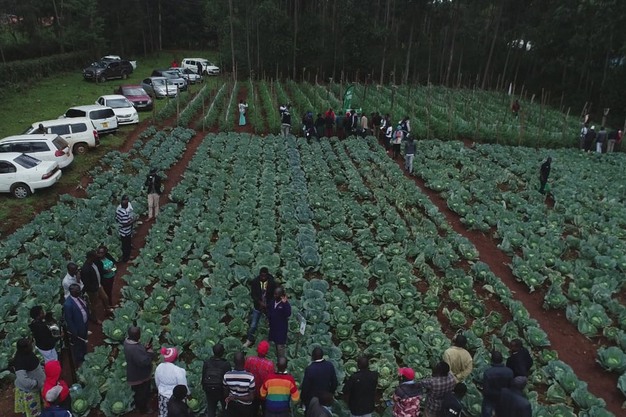
Teaching
A demo was set up in collaboration with a Dutch Breeder. Currently, this demo is integrated into the professionalized concept, leading a sort of 'mobile demo farms'. "Each month, we produce 3 to 4 million plants. Over the past 7 years, we have expanded from 1,500 square meters of production area to 8,000 square meters." However, Joshua emphasizes that it is not only the number of square meters that counts. "It's all about using every inch of this ground responsibly and sustainably. For this purpose, we use modern techniques, and for 6 months, we also use tissue culture. We involve people in every single step. Supporting and training locals are very much part of this concept."
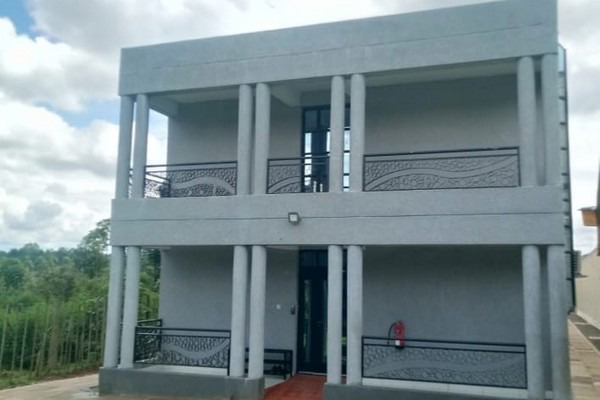
A complete tissue culture laboratory was built in 2022. Virus-free plant materials such as bananas, sweet potatoes, and potatoes for consumption are produced here.
Post-harvest management
One of GrowPact Kitale's latest steps forward is the arrival of a tissue culture laboratory. "At the moment, we produce virus-free plant material for five crops, including several banana types, sweet potatoes, and ware potatoes." A sixth crop is well underway. "We are introducing papaya crops. To do so, we are developing protocols as we did for the other crops."
Joshua points out that a lack of proper starting material hinders the further growth of the Kenyan horticulture sector. GrowPact, a concept that currently encompasses multiple branches that can be copied separately from each other, tackles this challenge. On top of that Joshua identifies a third challenge. "A lot can be gained in the post-harvest management sector. Think of cooling, limiting decay after production, as well as better organizing the chain to optimize sales, farm to fork."
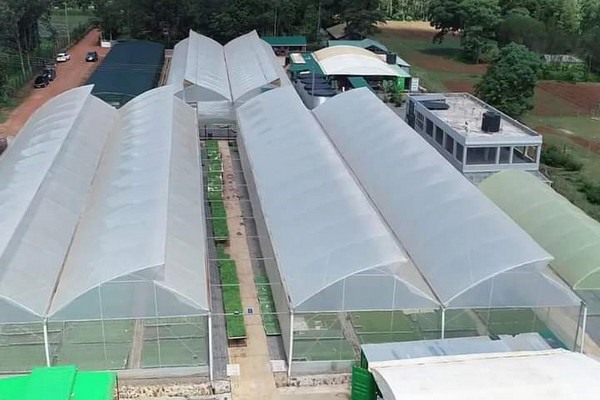 GrowPact Kitale has set up a Framer Management system to gather data for and about its customers. Joshua states that customer knowledge is crucial, at times seemingly trivial matters such as tray holes are highly relevant. "We use trays with 162 holes while growers from the nearby town Embu use trays with 424 holes."
GrowPact Kitale has set up a Framer Management system to gather data for and about its customers. Joshua states that customer knowledge is crucial, at times seemingly trivial matters such as tray holes are highly relevant. "We use trays with 162 holes while growers from the nearby town Embu use trays with 424 holes."
Adjusting local demand and circumstances
When they started in Kitale, they didn't know which obstacles they would meet along the way. Now, with the concept being ready to be expanded to other regions, Joshua offers some advice to other entrepreneurs: "Consider local cooperation so that you can solve problems together," he says. He also offers an example: "Our first greenhouse was a Dutch greenhouse. After a few months, we realized that this greenhouse was not suitable for temperatures above 40 degrees Celsius, which are quite common here. From that moment onwards, we adjusted the greenhouses to our circumstances."
When we meet Joshua, a new greenhouse has recently started to produce seeds. It's a pilot for a Dutch breeding company asking for seed production for a specific crop. "Again, we realized that you should carefully consider the local situation. Given our lack of experience with this specific crop, I asked for local advice. It appeared that this type of production involves a completely different way of registration and different parameters. None of us had expected this."
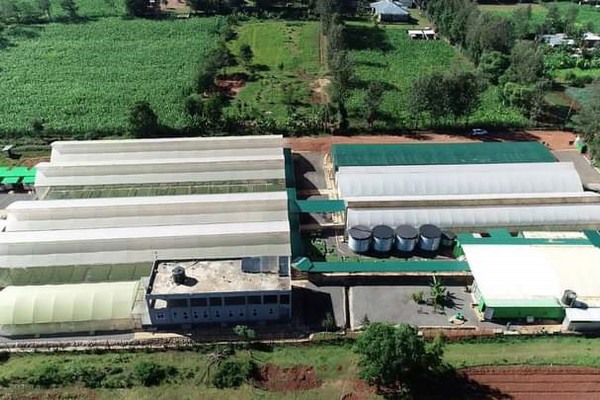
Recently a pilot started producing seeds. At the end of this year, GrowPact expects to return the first batch to the Dutch breeder.
A cigar box
By improving starting materials, GrowPact offers a way to improve local food production. "The innovator of this concept likes to compare it to a cigar box. You can pick from it. This concept functions similarly. You either opt for the entire concept or parts of it, such as the production of young plants."
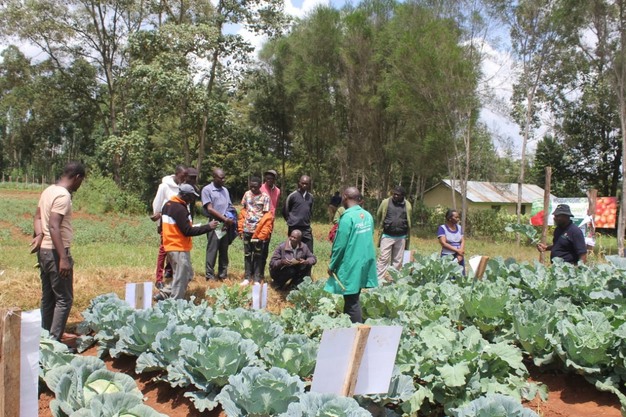 Conducting thorough preliminary research into the local situation is a must for anyone who wants to apply the GrowPact concept elsewhere.
Conducting thorough preliminary research into the local situation is a must for anyone who wants to apply the GrowPact concept elsewhere.
Meanwhile, Joshua sees a growing interest in the project. This interest comes from Dutch companies that demand GrowPact services, as well as from neighboring countries that are interested in copying this successful concept. "In these countries, the agrarian sector is often underdeveloped, before starting, they watch how we do it. NGOs aiming to improve local food production are also interested in the concept. As are Dutch entrepreneurs who like to launch a project similar to the one here in Kitale. The multiplier effect has taken effect, the example of our success is followed."
For more information: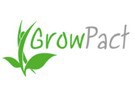
Joshua Mugendi
Jaap van den Beukel
GrowPact
info@growpact.com
info@growpactkenya.com
www.growpact.com
